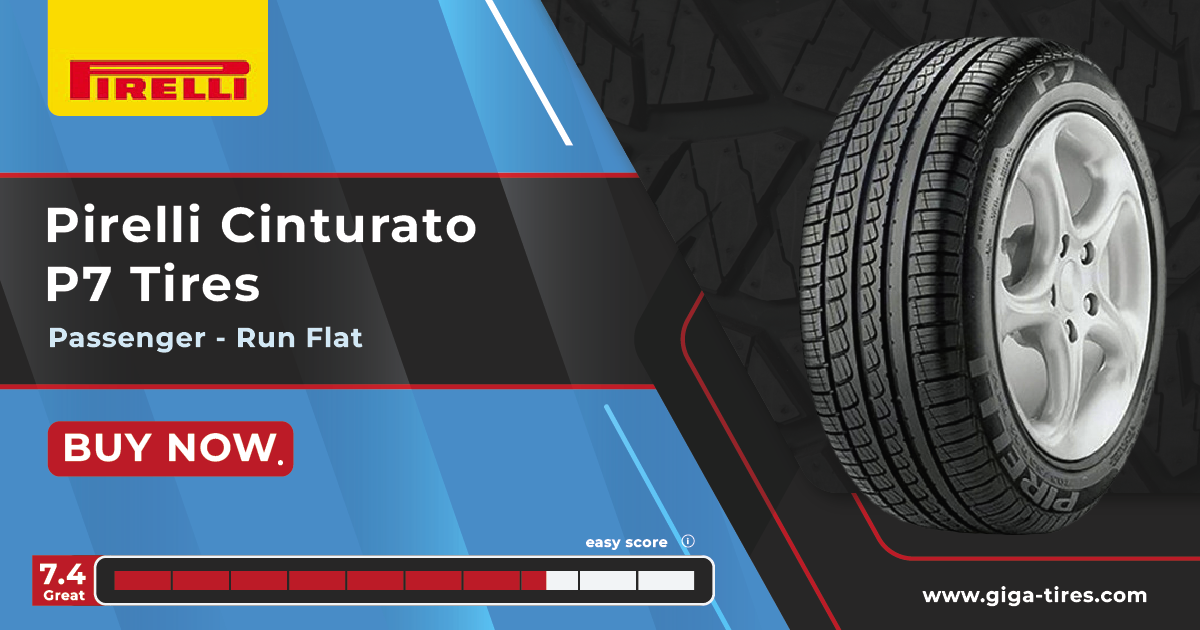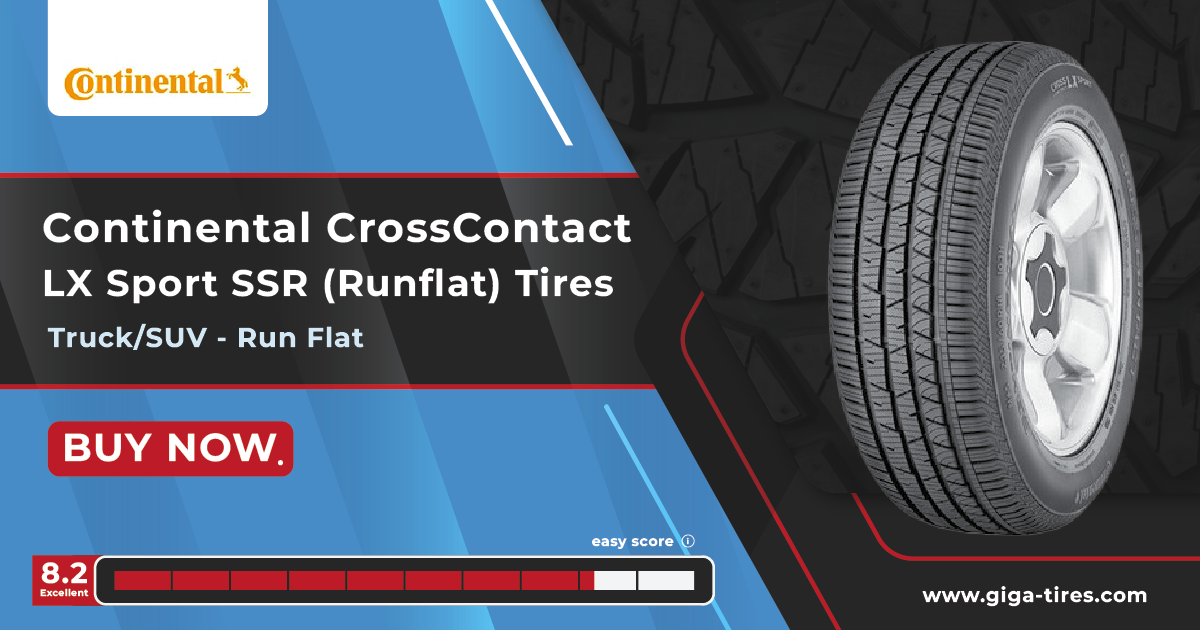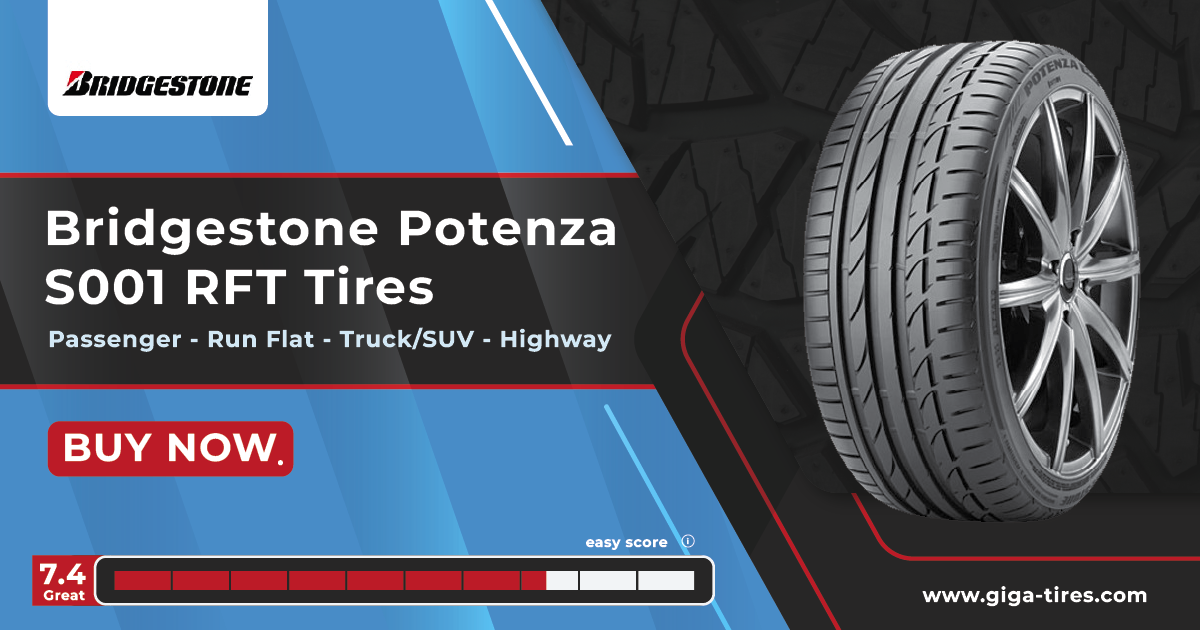Last Updated on 8 months
Do I need run flat tires, and what do they offer?
Run-flat tires (RFTs) are a relatively newer invention slowly gaining popularity.
Flat tires allow a vehicle to continue driving even after the tires have been punctured. This is possible because run-flat tires have reinforced sidewalls supporting the car’s weight even when a tire is deflated.
It is estimated that with a punctured tire, you can go as far as 50 miles, ideally at no more than 50 mph – but it’s safer to keep your distance shorter and speeds lower to minimize the chance of a complete blowout.
In addition, these tires are equipped with an emergency pressure sensor that alerts the driver when the tire is losing air. As a result, run-flat tires can provide safety and security that standard tires cannot match.
Why buy run-flat tires, and what is the correct tire size?
If you put a premium on being able to address risks to your safety, security, and convenience while driving, then buying yourself run-flat tires might be an excellent choice.
Also, these tires offer stability should you experience a tire blowout. With regular tires, however, such a scenario would immediately pose a problem with handling and steering.
Run flat tires are available for all types of vehicles, from cars to trucks to SUVs. And they come in a variety of sizes to fit your specific vehicle. So, if you’re looking for extra protection on the road, use run-flat tires. Remember to get the exact tire size that you have on your vehicle.
Run flat tires cost: is it worth it?
Run flat tires cost you more than if you were buying regular tires. Aside from being more expensive than standard tires, you are most likely to purchase new replacements when these get punctured because repairing these is not advisable.
So, is it worth it?
It depends on several factors you must consider, such as how often you drive on roads where punctures are likely, how much you value peace of mind, and how much you are willing to pay for the convenience of run-flat tires.
Ultimately, it is up to each driver to decide whether run-flat tires are worth the price. If you have the budget, though, this type of tire is worth considering. But read on as we discuss the pros and cons so you can evaluate much better.
Run flat tires Pros, Cons
There are a few key advantages:
- These allow you to keep driving even if you have a flat tire. If the tire is punctured, it can continue for 50 miles until you reach a safe, convenient destination for changing tires. This can be a massive advantage if you’re in the middle of nowhere or dangerous locations.
- These have reinforced sidewalls that help prevent blowouts.
- These tend to be more robust and more puncture-resistant than regular tires.
There are a few drawbacks as well:
- These are often more expensive than regular tires.
- These can be less comfortable to drive on since the reinforced sidewalls make them feel stiffer, making it a harsher ride (unless the suspension has been tuned appropriately).
- These may not work well in conditions like deep mud or snow.
It is important to note that run-flat tires may only be used on vehicles installed with a Tire Pressure Monitoring System (TPMS) so that you get TPMS alerts once a pressure loss in one of your tires is detected.
How long do run flat tires last?
The lifespan of these RFTs will vary depending on factors such as the make and model of the tire, how well they are maintained, and the owner’s driving habits.
However, most manufacturers estimate that run-flat tires will last between 25,000 and 50,000 miles.
Run flat tires in Our Online Shop: Powerful Sports Performance Tires
You can search our website for run-flat tires and choose which brand you like. Below, you’ll see samples from the different brands in our inventory:
1) Goodyear Efficient Grip ROF
Goodyear Efficient Grip ROF is a summer touring tire ideal for sports coupes and luxury sedans. This tire is designed with the Quiet Tred technology to provide a noise-free ride. It also offers superior road grip and handling capabilities without compromising the safety and quality of the ride.
2) Continental CrossContact LX Sport SSR
The Continental CrossContact LX Sport SSR is a sporty all-season tire with Run Flat construction for CUVs, SUVs, and pickups. It is designed for low noise and rolling resistance while enhancing ride comfort and all-season traction, even in light snow.
3) Bridgestone Potenza S001 RFT
Bridgestone Potenza S001 RFT is a high-performance summer run-flat tire with sidewalls that support even after a puncture and complete air pressure loss – ideal for high-performance sports cars, sedans, and coupes. It provides a noise-free and comfortable ride.
4) Pirelli Cinturato P7
 The Pirelli Cinturato P7 offers a safe and comfortable ride, with its innovative rubber material making this possible. Ideal for high-powered cars, this tire is highly efficient on dry and wet roads- its specially designed four wide grooves prevent hydroplaning and ensure good traction. This tire lets you enjoy a pleasant ride while giving you peace of mind knowing its durability.
The Pirelli Cinturato P7 offers a safe and comfortable ride, with its innovative rubber material making this possible. Ideal for high-powered cars, this tire is highly efficient on dry and wet roads- its specially designed four wide grooves prevent hydroplaning and ensure good traction. This tire lets you enjoy a pleasant ride while giving you peace of mind knowing its durability.
Choosing the right tires
There are a few things to remember when choosing tires for your car:
- You’ll want to consider the driving you do most often. If you live in an area with mostly city driving, you’ll want a different set of tires than if you’re constantly on the highway.
- Think about the climate you live in. Tires designed for warm weather won’t perform as well in the snow, and vice versa.
- Consider your budget and decide how much you will spend on tires.
Once you’ve considered all these factors, it’s time to start shopping.
The best place and the quickest way to begin is an online search for run-flat tires. Considering your driving needs, you’ll be able to find the right tires for your car. Also, you will find the best run flat tire deals online.
So, are run-flat tires worth the investment?
The bottom line is that these tires offer a high level of security when you’re driving.
If you’re ever faced with a puncture or blowout, running flat tires will allow you to keep going rather than changing a tire on the side of the road. That said, there are some drawbacks – these can be more expensive than traditional tires, and run-flat tires don’t always wear well.
But if you’re looking for added peace of mind while driving, run-flat tires could be the right choice for your car.
Contact our team today, and let us help you choose the perfect set of run-flat tires for your needs.
Conclusion
Choosing run-flat tires is a decision that requires careful consideration. In this guide, we’ve delved into the advantages and disadvantages of run-flat tires to help you make an informed choice. Whether you prioritize safety and convenience or are concerned about their drawbacks, your decision should align with your driving requirements.
Ready to equip your vehicle with run-flat tires?
Head over to Giga Tires today to explore our selection of run-flat tires. Ensure your peace of mind on the road with the right tires, and trust Giga Tires to provide you with quality and performance. Your journey to a safer and more reliable driving experience starts here!
Don’t stop here! Expand your tire expertise by browsing through our collection of articles on Giga Tires’ website.
- Exploring Cooper Tires: 100 Years Of Quality American Craftsmanship
- Online Tire Shop: The Easier Way To Get New Tires At Lower Prices
- Unlock Tire Speed Rating: Why Does Tire Speed Rating Matter?
FAQs
What is a run-flat tire?
A run-flat tire is a type of tire designed to continue supporting the weight of a vehicle even after it has lost air pressure due to a puncture. These tires are engineered with reinforced sidewalls that can carry the vehicle’s load for a limited distance at a reduced speed, allowing the driver to reach a safe location for repair or replacement.
What is the disadvantage of run-flat tire?
While run-flat tires offer the advantage of continued driving after a flat tire, they come with disadvantages. One of the primary drawbacks is the potential for a rougher ride, as the reinforced sidewalls can make the tires stiffer. Additionally, run-flat tires can be more expensive to replace than standard tires, and not all vehicles are equipped to use them, limiting the options for those considering this type of tire.
Is it reasonable to have run-flat tires?
Whether run-flat tires are a good choice depends on your priorities and driving circumstances. Run-flat tires offer enhanced safety by allowing you to go to a safe location in case of a flat tire, reducing the need for immediate roadside stops. However, they may not be ideal for all drivers due to their cost and ride comfort trade-offs. Assess your needs and consult a tire expert to determine if run-flat tires align with your preferences and driving habits.
What is so particular about run-flat tires?
Run-flat tires are unique because they support the vehicle’s weight even after losing air pressure. This feature provides added safety and convenience to drivers, reducing the risk associated with sudden flat tires and minimizing the need for immediate tire changes on the side of the road. Run-flat tires are designed to keep you mobile and in control, even in challenging situations, making them unique for those who prioritize safety and reliability.
















 Français
Français Español
Español